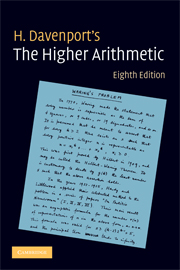Exercises
Published online by Cambridge University Press: 05 June 2012
Summary
The marks [H] and [A] affixed to questions indicate that the questions are provided with hints and answers respectively. If both are provided [H] [A], try the hint first. The mark [M] affixed to a question indicates that it requires a little more mathematical knowledge than was assumed in the body of the book, e.g. elementary complex numbers or trigonometry. Although such matters are hard to judge, the mark [+] has been used to indicate questions, or parts of questions, that are thought to be somewhat harder than average.
The first digit of a question number indicates which chapter it refers to. Some of the questions for chapter eight are easier to answer with a programmable calculator, computer algebra system, or a spreadsheet equipped with a ‘greatest common divisor’ function. Care must be taken with operations like raising to a power to ensure that the maximum size of integer is not exceeded—none of the questions need more than 12 digits, and most need fewer.
1.1 Prove, by induction or otherwise, that:
(a) The sum of the first n numbers is n(n + 1)/2 [This result is commonly said to have been discovered by Gauss at a very early age: see, e.g., E.T. Bell, Men of Mathematics, Simon & Schuster, New York, 1937 (reprinted Penguin, 1965)];
(b) The sum of their squares is n(n + 1)(2n + 1)/6;
(c) The sum of their cubes is n2(n + 1)2/4.
Information
- Type
- Chapter
- Information
- The Higher ArithmeticAn Introduction to the Theory of Numbers, pp. 209 - 221Publisher: Cambridge University PressPrint publication year: 2008
